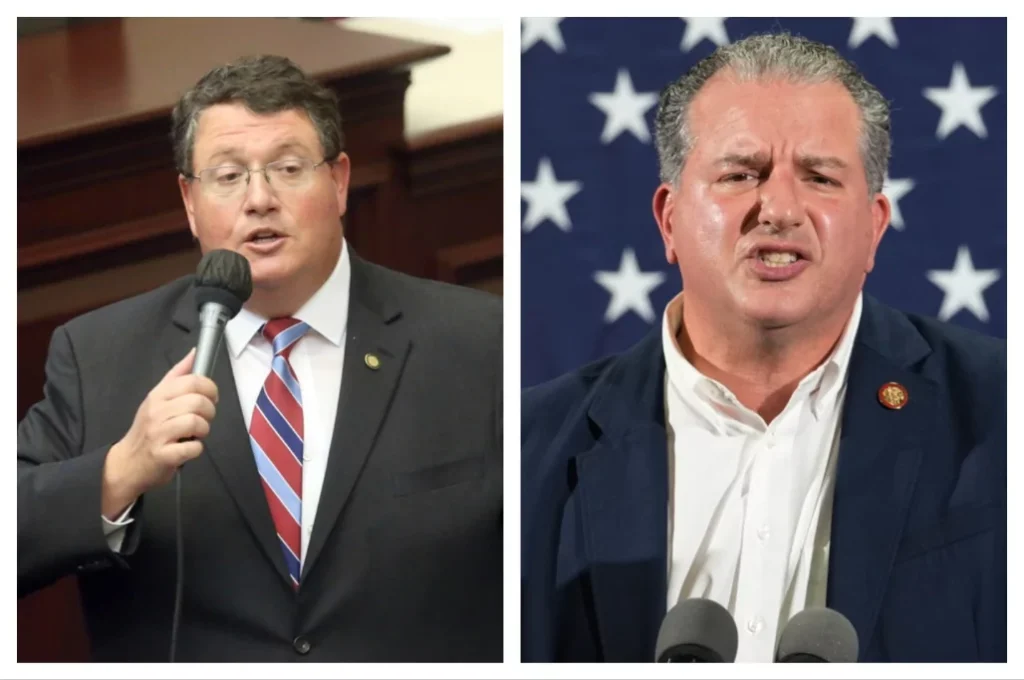The key lawmakers pushing a trio of cryptocurrency bills that passed during so-called “Crypto Week” on Capitol Hill are the top beneficiaries of crypto campaign cash, heightening concerns about the crypto industry’s increasing influence in U.S. economic policy.
So far this year, co-sponsors of two of the cryptocurrency bills debated by the House this week have received the most crypto-tied campaign money from corporate donors, according to a Washington Examiner analysis of Federal Election Commission data.
The top recipients of corporate crypto funding in 2025 include Rep. French Hill (R-AR), who introduced the Digital Asset Market Clarity Act, and House Majority Whip Tom Emmer (R-MN), lead sponsor of the Anti-CBDC Surveillance State Act. Both bills passed on Thursday.
HOUSE PASSES ‘CRYPTO WEEK’ LEGISLATION AFTER REPUBLICAN REVOLT
Hill, head of the House Committee on Financial Services, has quickly collected $180,500 in campaign contributions from an array of election spenders across the cryptocurrency sector, including $12,000 each from Marc Andreessen and Ben Horowitz, partners at the venture capital behemoth Andreessen Horowitz, which boasts the largest-ever crypto venture fund.
Emmer directly received $58,000 in similar sourcing from his fundraising committee and victory fund. Emmer Majority Builders, a joint PAC working to maintain Republican control of Congress, already amassed $433,800 in Big Crypto donations, four-fifths of it from the Winklevoss twins, who co-own the Gemini cryptocurrency exchange.
CLARITY Act co-sponsor Rep. Richie Torres (D-NY), co-founder of the Congressional Crypto Caucus alongside Emmer, took in $116,500, including $27,000 from Ripple chairman Chris Larsen and a combined $12,000 from Coinbase CEO Brian Armstrong.

In 2024, nearly 300 crypto-aligned candidates clinched seats in Congress, according to Stand With Crypto, a congressional monitor launched by Coinbase for investors to track which political hopefuls favor crypto. Armstrong, of Coinbase, dubbed the outcome “America’s most pro-crypto Congress ever.”
The crypto industry accounted for almost half (44%) of all corporate dollars doled out in the 2024 elections, according to spending watchdog Public Citizen.
Notably, Sen. Bill Hagerty (R-TN), who had introduced the Guiding and Establishing National Innovation for U.S. Stablecoins (GENIUS) Act, the third cryptocurrency bill under House consideration this week, secured $98,000 in campaign financing from crypto executives between 2023 and 2024, well before he announced his 2026 reelection bid.
So did GENIUS Act co-sponsors Sens. Cynthia Lummis (R-WY), with $85,300, and Tim Scott (R-SC), with $64,700. Among the top Lummis donors, Matt Huang and Fred Ehrsam, managing partners at Paradigm, a spin-off of Coinbase and crypto investor Sequoia Capital, each donated $11,600 to her victory committee.
Pro-crypto PACs in play
Fairshake, a super PAC cohort bankrolled by top cryptocurrency companies and C-suite political playmakers, has collected over $141 million in its war chest heading into the 2026 election season. The vote breakdown on Crypto Week’s slate of bills will likely determine how the haul will be disbursed, if not the latter’s looming presence influencing the former.
CRYPTO BUILDS 2026 WAR CHEST TO PROTECT FOOTHOLD IN CONGRESS
Member organizations of this well-funded network, Fairshake affiliates Defend American Jobs and its progressive counterpart Protect Progress, have already spent sizable sums in 2025 on congressional ad campaigns ahead of the special U.S. House elections.

Defend American Jobs, a single-issue super PAC focused on blockchain policy, poured $1.67 million and $558,800, respectively, into campaign ads supporting now-elected Reps. Randy Fine (R-FL) and Jimmy Patronis (R-FL), according to FEC filings. The Florida freshmen went on to win their special elections in April, replacing former Republican Reps. Mike Waltz and Matt Gaetz.
Fine and Patronis, both high-profile supporters of “crypto innovation,” were expected to vote to support the GENIUS Act, passed on Thursday, sending the bill to President Donald Trump’s desk.
Patronis, formerly Florida’s chief financial officer, pushed to include Bitcoin investments in the state’s pension portfolio. As of January, his wife owns between $1,000 and $15,000 in Bitcoin stock, Patronis reported in a financial disclosure report.
BITCOIN BREAKS ALL-TIME HIGH AS CONGRESS CONSIDERS PRO-CRYPTO LEGISLATION
Meanwhile, pro-crypto political committee Protect Progress invested $1 million in ad buys backing James Walkinshaw, a Virginia Democrat seeking to fill the seat of deceased Rep. Gerry Connolly (D-VA), his old boss, in a September special election. The eleventh-hour advertising blitz had helped secure Walkinshaw’s primary victory in June over a crowded field of other liberal candidates.
If elected, Walkinshaw appears poised to support similar cryptocurrency measures in Congress that embrace blockchain. Walkinshaw, previously Connelly’s chief of staff, is campaigning to integrate new technologies, mainly blockchain, as part of his economic development plan for Northern Virginia.
“Blockchain, for example, can reduce administrative costs for businesses and lower fees for consumers,” the priorities page on Walkinshaw’s campaign website says. “Congress should establish modern, risk-based regulatory frameworks that support responsible innovation and prevent abuse.”
Last election cycle, these super PACs spent the most of all crypto-centered committees on advertising expenses, boosting the successful Senate bids of businessman Sen. Bernie Moreno (R-OH), with Defend American Jobs spending $40.1 million; then-Rep. Ruben Gallego (D-AZ), with Protect Progress paying out $10 million, and then-Rep. Elissa Slotkin (D-MI), with Protect Progress spending another $10 million.
Thanks to significant support from the crypto PAC funding, political outsider Moreno, a blockchain entrepreneur and co-sponsor of the GENIUS Act, defeated former Senate Banking Chair Sherrod Brown, a crypto skeptic who frequently spoke about “cracking down on cryptocurrency.”
Gallego, now the highest-ranking Democrat on a Senate subcommittee overseeing digital assets, which Lummis chairs, emerged as a pro-cryptocurrency power player when he joined a GOP contingency on passing the GENIUS Act.
SENATE CONSIDERS ‘RULES OF THE ROAD’ FOR BITCOIN AT DIGITAL ASSET HEARING
Republicans found bipartisan support from Gallego, once critical of cryptocurrency, and Slotkin on ultimately pushing the GOP-led legislation through the Senate, though they initially voted no on a motion to proceed due to last-minute provisional changes. While in the House, Slotkin sponsored accountability bills to curb crypto corruption.
Fairshake spent $10 million on ad campaigns opposing the Senate run of outspoken crypto critic Rep. Katie Porter (D-CA), who later lost her party’s nomination during the primary race against Sen. Adam Schiff (D-CA). On the campaign trail, Schiff filled out Stand With Crypto’s candidate questionnaire, indicating that he would vote for legislation legitimizing digital assets. He kept this pledge by backing the GENIUS Act’s passage despite originally voting against it, moving forward as is.
Robert Schmad contributed to the reporting of this article.
























